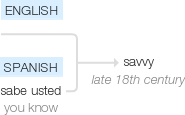Savvy
late 18th century: originally black and pidgin English imitating Spanish sabe usted ‘you know’.
wiktionary
Alteration of save, sabi(“know”) (in English-based creoles and pidgins), from Portuguese or Spanish sabe(“[she/he] knows”), from saber(“to know”), from Latin sapiō(“to be wise”).
1785, as a noun, “practical sense, intelligence”; also a verb, “to know, to understand”; West Indies pidgin borrowing of French savez(-vous)(“do you know”), Portuguese (você) sabe(“you know”) or Spanish (usted) sabe(“you know”), all from Vulgar Latin *sapere, from Latin sapere(“be wise, be knowing”) (see sapient). The adjective is first recorded 1905, from the noun.
etymonline
savvy (n.)
1785, "practical sense, intelligence;" also a verb, "to know, to understand;" West Indies pidgin borrowing of French savez(-vous)? "do you know?" or Spanish sabe (usted) "you know," both from Vulgar Latin *sapere, from Latin sapere "be wise, be knowing" (see sapient). The adjective is first recorded 1905, from the noun. Related: Savvily; savviness.
